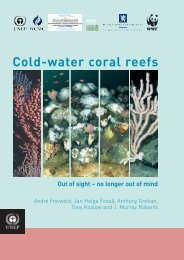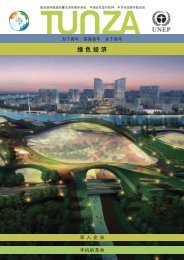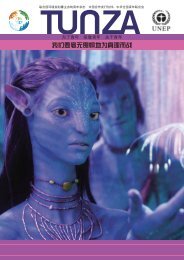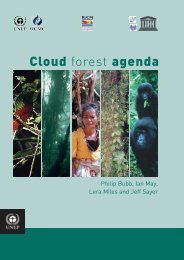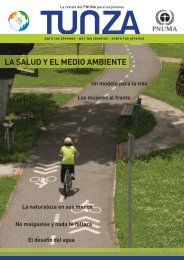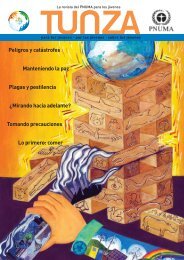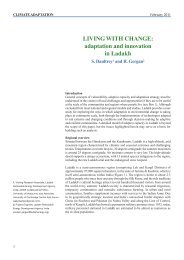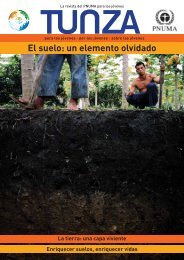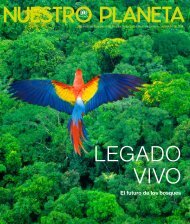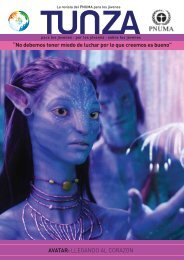Tunza Vol. 8.3 - UNEP
Tunza Vol. 8.3 - UNEP
Tunza Vol. 8.3 - UNEP
You also want an ePaper? Increase the reach of your titles
YUMPU automatically turns print PDFs into web optimized ePapers that Google loves.
Changing<br />
focus<br />
What you do not count often does not count. Accounting systems determine goals,<br />
shape our way of life and profoundly affect the planet.<br />
‘Our national accounting systems are fixated on what we can produce,’ says statistician<br />
Nic Marks, who has done pioneering research on human well-being. ‘This is outdated,<br />
appeals to human greed, and has stripped Earth of its resources. Yet as Robert Kennedy<br />
Jnr. said, “The Gross National Product measures everything except<br />
that which makes life worthwhile.” We need to redesign our systems<br />
to be based upon such things as sustainability, social justice and<br />
people’s well-being.<br />
K. Drakos/<strong>UNEP</strong><br />
A. Payne/<strong>UNEP</strong><br />
‘Social scientists have already found that people overwhelmingly want<br />
happiness for themselves, their families and communities, no matter<br />
where they are. They want health, to live long and fully. They want love<br />
– a fundamental human need. These are universal human aspirations.<br />
So why not think of the progress of nations in these terms, rather than<br />
in numbers measuring production and consumption?’<br />
So, as Marks says, a concrete goal of achieving well-being within<br />
environmental limits has to be set. And, to help establish the<br />
parameters of this goal, he developed the Happy Planet Index, which juxtaposes 143<br />
countries’ levels of well-being – measured in life satisfaction and expectancy – against<br />
how much of the planet’s resources each country uses – its Ecological Footprint – to<br />
achieve them. ‘It’s an efficiency measure,’ he says. ‘How much well-being does each<br />
country get for its resource use?’<br />
Predictably, the USA and the Gulf States were shown as having high<br />
rates of well-being but using a large number of resources, while<br />
countries in sub-Saharan Africa had low well-being and used the<br />
fewest resources. So neither scored well.<br />
Costa Rica did best. Its people enjoy a higher life expectancy than<br />
North Americans, while using a quarter of the resources per person<br />
of a typical Western country. In all, Latin America turned out to be<br />
the champion continent, with nine of the top ten nations. ‘While<br />
nations that score well aren’t necessarily the happiest on the planet,<br />
they show that it’s possible to achieve long, happy lives without overstretching<br />
the planet’s resources,’ says Marks.<br />
Working towards human and environmental well-being – pulling the<br />
Reichling/<strong>UNEP</strong><br />
rest of the world closer to Costa Rica on the index – would require<br />
different approaches in developed and developing nations, he says. ‘The first things<br />
Western countries spend their higher GDPs on are health and education. These public<br />
goods are key to generating public well-being. So achieving sustainability in the West<br />
means convincing people to shed a load of stuff we don’t need, then shifting focus from<br />
individuals acquiring more to redistribution of resources.’<br />
In developing countries, the first priorities are adequate water, food, infrastructure –<br />
and beyond that, convincing people that it is not worth losing culture and connectedness<br />
in the blind acquisition of material wealth. ‘Such thinking really is a challenge to the<br />
Western model, which is what we’ve always tried to market to developing countries in<br />
the name of development, creating a race that no one wins.’<br />
And on a personal level? ‘We’ve done an evidence-based study on what generates wellbeing.<br />
It breaks down into “Five Ways”: connect, be active, take notice, keep learning,<br />
and give. These are universal actions, none of which need a lot<br />
of resources. It’s a question of being creative.’<br />
The Happy Planet Index and Five Ways to Well-being<br />
www.neweconomics.org/projects/happy-planet-index<br />
www.neweconomics.org/projects/five-ways-well-being<br />
H. Hearing/<strong>UNEP</strong> M.E. Widener/<strong>UNEP</strong><br />
More from less: Resources and the environment 5



